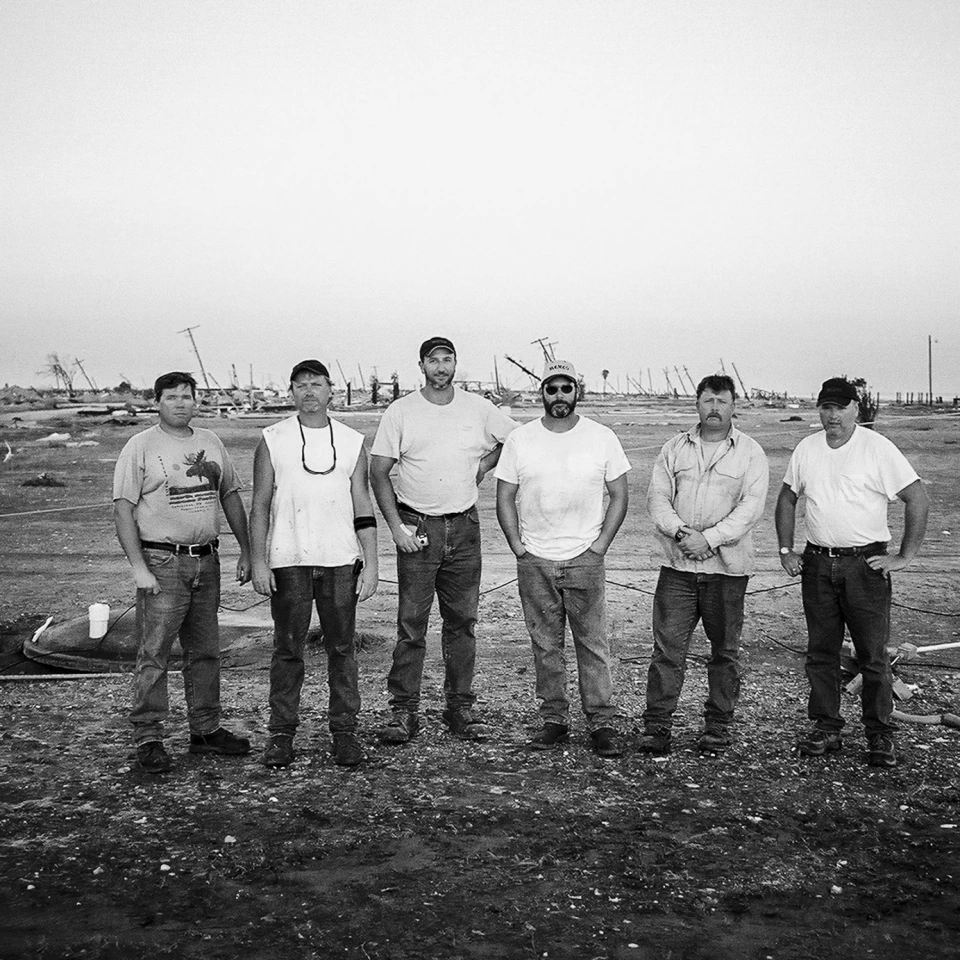It was a Monday. Visibility depended on geography. Hurricanes Katrina and Rita were brewing on the Gulf Coast of Louisiana. Levee breaches began before dawn and by 6:10 a.m., Katrina made its second landfall. It has been described as the storm that drowned a city.
Hurricane Katrina devastated much of the Louisiana coast on August 29, 2005.
The magnitude of the destruction and need was evident. As a member of the cooperative utility community, the Co-op sent a caravan of bucket trucks and support vehicles with a team of 11 employees – seven lineworkers and four service representatives – to aid in the recovery effort. They left our Plymouth headquarters on September 25 and travelled almost 2,000 miles during the course of three days. Our team became part of the national fabric of essential responders.
Twenty years later, the aftermath of Katrina is still very vivid.
Today, Paula Burbank, a Plant Services Coordinator, and then Lineworker First Class Mark Monahan, now System Electrician I, share their experiences from being part of the 11-member volunteer crew that travelled to Louisiana to aid in the recovery effort. Paula speaks to the work that was done by the all-female office team of four, who assisted the southern co-ops with everything from getting their computer programs up and running to listening to members who just needed to talk as they processed what was happening to their community, their lives. Mark speaks to what it was like working in the field, the impact of devastation, the sights, the smells of loss.
Paula’s sidebar:
Stunning was how Paula describes the difference between the pre-Katrina video of the area that the staff was shown and then what it was like to drive to the same locations and see the aftermath.
“It was very flat. Down where the devastation was, though, you could see for miles and miles and miles. There was no end in sight of the land or the water or whatever you were looking at. It had taken away just about anything that had any height to it,” Paula said. “I can’t imagine how beautiful it was before the storm.”
It was unusual that the Co-op’s office staff would be sent, but it turns out that the Louisiana co-ops used the same NISC computer software that we use in New Hampshire. Our office staff took on many functions and retiree Joanne Cordero, who was part of the IT department, was instrumental in getting the system to function again. “It was a pretty glorious moment when she got them up,” Paula said.
“When we were there, it was nice because we could do some office work and it meant that the staff member could go have dinner with co-workers or their families for a few hours. At least be able to go and take care of some things and know that we could handle the office side for a little bit. For us it was great because we knew we could give them a little reprieve,” she said.
Now, especially on the anniversaries, Paula said she thinks about the people of Louisiana and in particular the co-ops. “But sometimes it’s just the smallest thing – a matter of a rainstorm coming in or the thought of a flood threat happening here. It will take me back, but I don’t forget it. It was one of the most memorable moments of my career here,” she said. “I don’t ever want to forget it. .”
Mark’s sidebar:
Mark and his younger brother Matt worked in concert. They had hauled a digger truck, packed with a hefty supply of Gatorade and water to be able to give to people in Louisiana. The weather was good those early driving days and even in the first few days of initial assignments, they were able to get to some small residential areas closer to the coast which had not been as hard hit. There, they could run lines and connect people because there was still a circuit with which they could work.
Their next assignments brought them to incredibly devastated areas. Our equipment dictated the kind of work our volunteers could take on. Their time was spent framing some poles and getting ready for wire runs. And amidst the personal loss of people and property, there was a loss of animals. Their decay could be overpowering where the crews worked.
Mark has been through other mutual aid trips, but, he says, he remembers talking to his family about how bad this storm was.
“We’re very fortunate still even up here in the northeast where we fight the different temperatures, we’re still very fortunate. It was devastating to see what other people had lost,” Mark said, noting that he has been on other aid trips to Vermont or Maine.
“It’s a little more uplifting after you’ve been someplace like that for a week and we’ve just had a bad windstorm and a bad cold snap and everybody got turned back on maybe within five or six days. I have more gratitude about that and felt like I was more of a help. But Hurricane Katrina was a whole different, it was a whole different cat,” Mark said.
